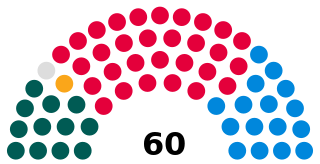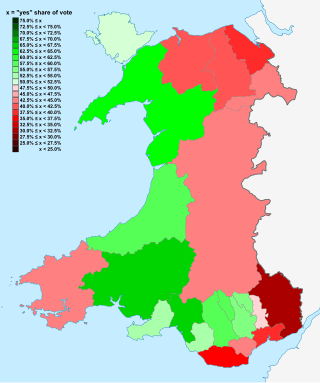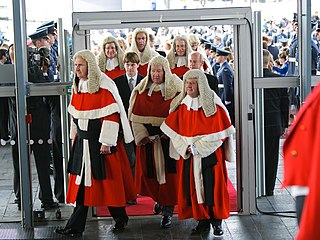Related Research Articles
Plaid Cymru is a centre-left to left-wing, Welsh nationalist political party in Wales, committed to Welsh independence from the United Kingdom.

The Senedd, officially known as the Welsh Parliament in English and Senedd Cymru in Welsh, is the devolved, unicameral legislature of Wales. A democratically elected body, it makes laws for Wales, agrees certain taxes and scrutinises the Welsh Government. It is a bilingual institution, with both Welsh and English being the official languages of its business. From its creation in May 1999 until May 2020, the Senedd was known as the National Assembly for Wales.

The Welsh devolution referendum of 1997 was a pre-legislative referendum held in Wales on 18 September 1997 over whether there was support for the creation of a National Assembly for Wales, and therefore a degree of self-government. The referendum was a Labour manifesto commitment and was held in their first term after the 1997 election under the provisions of the Referendums Act 1997. This was the second referendum held in Wales over the question of devolution: the first referendum was held in 1979 and was defeated by a large majority.

Welsh nationalism emphasises and celebrates the distinctiveness of Welsh culture and Wales as a nation or country. Welsh nationalism may also include calls for further autonomy or self determination which includes Welsh devolution, meaning increased powers for the Senedd, or full Welsh independence.

Politics in Wales forms a distinctive polity in the wider politics of the United Kingdom, with Wales as one of the four constituent countries of the United Kingdom (UK).

Welsh republicanism or republicanism in Wales is the political ideology of a Welsh republic, as opposed to Wales being presided over by the monarchy of the United Kingdom.
Yes for Wales! is the name used to refer to two separate cross-party pro-devolution groups that were formed in the lead up to the 1997 and the 2011 devolution referendums held in Wales.

Welsh law is an autonomous part of the English law system composed of legislation made by the Senedd. Wales is part of the legal jurisdiction of England and Wales, one of the three legal jurisdictions of the United Kingdom. However, due to devolution, the law in Wales is increasingly distinct from the law in England, since the Senedd, the devolved parliament of Wales, can legislate on non-reserved matters.

Welsh independence is the political movement advocating for Wales to become a sovereign state, independent from the United Kingdom.

The referendum on the law-making powers of the National Assembly for Wales was a non-binding referendum held in Wales on 3 March 2011 on whether the National Assembly for Wales should have full law-making powers in the twenty subject areas where it has jurisdiction. The referendum asked the question: ‘Do you want the Assembly now to be able to make laws on all matters in the 20 subject areas it has powers for?’

Richard Wyn Jones is a Welsh academic at Cardiff University, where he is Director of Cardiff University's Wales Governance Centre and Dean of Public Affairs. Jones was a former Professor of Welsh Politics at Cardiff as well as the founding Director of the Institute of Welsh Politics and Critical Security Studies at Aberystwyth University.
The Commission on Devolution in Wales, also known as the Silk Commission, was an independent commission established by Welsh Secretary Cheryl Gillan on 11 October 2011. The commission was based at the Wales Office Cardiff headquarters, at Cardiff Bay and met for the first time on 4 November 2011 at the Millennium Stadium, Cardiff. The commission reviewed the case for the devolution of fiscal powers to the Welsh Assembly, now the Senedd, and considered the case for increasing the powers of the assembly. It published its findings in two parts.

Unionism in Wales is the political view that supports a political union between Wales and the other countries of the United Kingdom. As well as the current state of the UK, unionism may also include support for Federalism in the United Kingdom and a United Kingdom Confederation.
The Abolish the Welsh Assembly Party, or in Wales, simply Abolish, is a registered single issue political party in Wales. It campaigns for the abolition of the Senedd, formerly known as the "National Assembly for Wales", the devolved legislature of Wales. Abolish advocates that devolved powers be returned to the Secretary of State for Wales within the UK Central Government and the Parliament of the United Kingdom at Westminster.
Roger Awan-Scully,, also known as Roger Scully, is a British political scientist and academic. He has authored numerous books including: Becoming Europeans? Attitudes, Behaviour, and Socialization in the European Parliament, and co-authored Representing Europe’s Citizens? Electoral Institutions and the Failure of Parliamentary Representation in Europe and Wales Says Yes: Devolution and the 2011 Welsh Referendum. He is full professor of political science at the School of Law and Politics of Cardiff University. He is principal investigator for the ESRC-funded 2016 Welsh Election Study. Scully studied at the University of Lancaster and the University of Durham, and earned a PhD from Ohio State University. He was lecturer in European politics at Brunel University from 1997 to 1999, and joined Aberystwyth University in January 2000. At Aberystwyth, he was promoted to senior lecturer (2004) and reader (2006), before becoming professor of political science in 2007.

The Riverside electoral ward of Cardiff covers the Riverside and Pontcanna areas of the city, electing three councillors to Cardiff Council. The ward was originally created in 1890, as a ward to Cardiff County Borough Council.
In the run-up to the 2021 Senedd election, various organisations are expected to carry out opinion polling to gauge voting intentions. Results of such polls are displayed in this list. Most of the pollsters listed are members of the British Polling Council (BPC) and abide by its disclosure rules.

The Institute of Welsh Affairs (IWA) is an independent charity and membership-based think-tank based Cardiff, Wales, which specialises in public policy and debate around the economy, education, environment and health sectors in Wales.

Taxation in Wales typically comprises payments to one or more of the three different levels of government: the UK government, the Welsh Government, and local government.

Welsh devolution is the transfer of legislative power for self-governance to Wales by the Government of the United Kingdom. Wales was conquered by England during the 13th century; the 1284 Statute of Rhuddlan caused Wales to lose its de facto independence and formed the constitutional basis for it as a principality in the "Realm of England". The Laws in Wales Acts 1535 and 1542 applied English law to Wales and united the Principality and the Marches which effectively ended both and incorporated Wales into England. The Wales and Berwick Act 1746 defined "England" to include Wales until the Welsh Language Act 1967, which separated Wales from England within the sovereign state of the United Kingdom.
References
- ↑ "Reshaping the Senedd". www.electoral-reform.org.uk. Retrieved 10 September 2019.
- ↑ "Latest news". Cardiff University. Retrieved 10 September 2019.
- ↑ ""Cut to the bone?" Wales Governance Centre releases report into impact of austerity on Welsh councils". Wrexham.com. Retrieved 10 September 2019.
- 1 2 3 4 5 Wyn Jones, Richard (8 October 2013). "Size Matters: Making the National Assembly more effective" (PDF). Electoral Society Cymru. Retrieved 10 September 2019.
{{cite web}}: CS1 maint: url-status (link)

